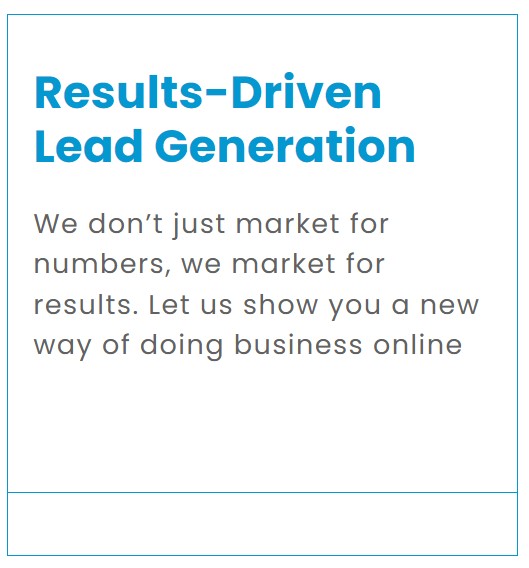In the rapidly evolving digital landscape, where consumer behavior is marked by its dynamic nature, businesses are in a perpetual quest to refine their lead generation strategies. The traditional methods of broad-reaching marketing have given way to a more targeted and personalized approach. This shift is not merely a trend; it’s a necessity in an era where consumers demand not just products or services but experiences tailored to their unique needs and preferences. In this comprehensive exploration, we will navigate the intricate landscape of personalized marketing, dissecting its various dimensions, and elucidate how it stands as the linchpin for driving tangible and sustainable results in lead generation.
The Evolution of Lead Generation
The journey of lead generation has traversed a considerable distance, shaped by technological advancements, changing consumer expectations, and the sheer volume of information available. What once worked reliably in terms of cold calling and generic email campaigns is now met with increasing skepticism and resistance. As consumers become more discerning, businesses must pivot their strategies to align with this shift, recognizing that a one-size-fits-all approach is no longer viable.
Enter Personalization
At the core of modern lead generation strategies lies the transformative concept of personalization. This involves the careful customization of marketing messages, content, and experiences to cater to the specific needs and preferences of individual prospects. It’s not just about addressing recipients by name; it’s about creating an immersive and personalized journey for each potential lead. This nuanced and targeted methodology fosters a more meaningful connection between businesses and their audience, transcending the transactional nature of traditional marketing.
Driving Results Through Personalization
Enhanced Customer Engagement
The crux of personalization’s efficacy in lead generation lies in its ability to enhance customer engagement. When prospects feel that a brand understands their unique needs and preferences, they are more likely to engage with the content and, consequently, convert into leads. Personalized emails, for example, have demonstrated a significant outperformance over generic ones in terms of open rates and click-through rates, underlining the power of tailored communication.
This enhanced engagement is not confined to email marketing; it permeates various touchpoints of the customer journey. Whether it’s a personalized landing page, a targeted social media post, or a dynamically customized website experience, personalization creates a sense of relevance that captures and sustains the attention of potential leads.
Tailored Content for Different Buyer Personas
The foundation of effective lead generation is a deep understanding of the target audience. Personalization enables businesses to create and deliver content that resonates with specific buyer personas. By tailoring messages to address the pain points and interests of different segments of their audience, businesses can build stronger connections and drive higher-quality leads.
This approach goes beyond the basics of segmentation; it involves crafting content that speaks directly to the unique challenges and aspirations of distinct buyer personas. Through this tailored content, businesses position themselves not just as providers of products or services but as partners in addressing the specific needs of their audience.
Dynamic Website Personalization
The user experience on a website plays a pivotal role in lead generation. Personalizing the website experience based on a visitor’s past interactions, preferences, and demographics can significantly impact conversion rates. Dynamic content, personalized recommendations, and targeted calls-to-action create a more tailored and compelling journey for each visitor, increasing the likelihood of capturing valuable leads and keeping them engaged throughout their online experience.
Consider a scenario where a visitor, who has previously shown interest in a particular product category, lands on the website. Through dynamic personalization, the website can showcase related products, offer exclusive deals, or present content that aligns with the visitor’s past interactions. This not only enhances the visitor’s experience but also increases the chances of converting them into a lead.
Behavioral Tracking and Data-driven Insights
The power of personalization is inherently tied to the data it relies upon. By leveraging advanced analytics and tracking tools, businesses gain valuable insights into the behavior of their prospects. Understanding how visitors interact with content, what products or services they are interested in, and their journey through the sales funnel enables businesses to make informed decisions and personalize their lead generation strategies for maximum impact.
Behavioral tracking extends beyond the digital realm. For instance, a customer’s interactions with a physical store, preferences expressed through loyalty programs, or feedback provided on previous purchases all contribute to a rich tapestry of data. This multifaceted approach allows businesses to create a holistic view of their customers, enabling them to deliver personalized experiences both online and offline.
Personalized Email Campaigns
Email marketing remains a cornerstone of lead generation, and personalization takes it to the next level. Beyond addressing recipients by name, personalized email campaigns can utilize data to deliver highly relevant content, product recommendations, and exclusive offers. Segmentation and automation play key roles in ensuring that the right message reaches the right person at the right time, driving improved conversion rates, and fostering a sense of individualized connection.
Consider an e-commerce scenario where a customer has abandoned their shopping cart. A personalized email can be triggered, not just as a reminder but also offering a limited-time discount on the items left behind. This level of personalization not only reengages the customer but also demonstrates a proactive understanding of their preferences and behaviors.
Social Media Personalization
Social media platforms provide a wealth of data about user preferences and behaviors. Businesses can harness this information to create personalized social media campaigns that resonate with their target audience. From targeted ads to personalized messaging, social media personalization can significantly boost lead generation efforts, meeting potential customers where they already spend their time online.
Social media platforms are not just channels for broadcasting messages; they are interactive spaces where businesses can actively engage with their audience. By analyzing social media interactions, businesses can gain insights into the topics that resonate, the content that captures attention, and the preferences of their audience. This information becomes instrumental in tailoring social media campaigns that not only attract leads but also foster ongoing engagement.
Artificial Intelligence and Machine Learning
Advancements in artificial intelligence (AI) and machine learning (ML) have propelled personalization to new heights. These technologies enable businesses to predict customer behavior, automate personalized content delivery, and continuously optimize strategies based on real-time data. The result is a more adaptive and effective lead generation ecosystem, where the power of data is harnessed to predict and fulfill the unique needs of each prospect.
AI and ML algorithms can analyze vast datasets to identify patterns and predict future behavior. For example, an e-commerce platform can use machine learning to analyze a customer’s past purchases, browsing history, and demographic information to predict their preferences and suggest personalized product recommendations. This level of predictive personalization not only enhances the customer experience but also streamlines the lead generation process by presenting prospects with offerings tailored to their likely preferences.
Challenges and Considerations
While personalization holds immense potential for driving results in lead generation, it is not without its challenges. Striking the right balance between customization and privacy, ensuring data security, and avoiding the pitfalls of over-personalization are critical considerations. Businesses must navigate these challenges with transparency and ethical practices to build trust with their audience, recognizing that the misuse of personal data can erode the very connections they seek to build.
Privacy Concerns
As personalization relies heavily on collecting and utilizing customer data, privacy concerns are at the forefront of the challenges faced by businesses. Striking a balance between delivering personalized experiences and respecting user privacy is crucial. Clear communication about data usage, obtaining consent, and adhering to data protection regulations are essential components of an ethical personalization strategy.
Data Security
The proliferation of data-driven personalization brings with it the responsibility of safeguarding that data. Security breaches can not only damage a company’s reputation but also erode the trust of potential leads. Robust data security measures, encryption protocols, and regular audits are imperative to ensure the protection of customer information.
Over-Personalization Risks
While personalization is a potent tool, overdoing it can have adverse effects. Bombarding customers with highly personalized content or recommendations can come off as intrusive or even creepy. Striking the right balance between relevance and avoiding an overly intrusive approach requires a nuanced understanding of customer expectations and preferences.
Data Quality and Accuracy
The effectiveness of personalization is directly linked to the quality and accuracy of the data being used. Inaccurate or outdated data can lead to misguided personalization efforts, diminishing the impact of the strategy. Implementing robust data validation processes and regularly updating customer profiles are essential for maintaining data accuracy.
Conclusion
In a digital landscape saturated with information and choices, the power of personalization emerges as a guiding force, directing businesses toward successful lead generation. From tailoring content to engaging prospects on social media, the personalized approach is reshaping the way brands connect with their audience. By leveraging data, technology, and a deep understanding of their target market, businesses can drive tangible results in lead generation, fostering stronger relationships and sustainable growth in an increasingly competitive environment.
As we embrace the era of personalization, businesses that master this art will not only survive but thrive, creating lasting impressions that resonate with their audience on an individual level. In a world where every interaction is an opportunity to forge a connection, personalized lead generation isn’t just a strategy; it’s a commitment to understanding and meeting the unique needs of each prospect. The future of lead generation is personalized, adaptive, and driven by the power of understanding. As businesses continue to refine their strategies, those that prioritize personalization will undoubtedly find themselves at the forefront of driving results in lead generation, forging a path toward sustained success in the digital age.


